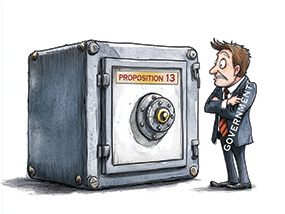
The California Legislature has proposed a constitutional amendment that would change the rules for passing initiatives that protect taxpayers. Assembly Constitutional Amendment 13 (ACA 13, approved for the ballot by the Legislature in 2023) may be the most serious threat we have confronted in the 46-year history of Proposition 13.
Politicians and special interests have used every trick to try to undermine or evade Prop. 13’s taxpayer protections. They’ve tried renaming taxes as “fees.” They’ve used the courts to interpret away the constitutional rights of taxpayers. They’ve tried to pass ballot measures to make it easier to raise taxes, using scare tactics and misleading ads.
Fortunately, the Howard Jarvis Taxpayers Association has been able to close loopholes carved into Prop. 13 by responding with new initiatives such as Prop. 218, The Right to Vote on Taxes Act, in 1996.
But now the tax-raisers are trying to undermine democratic voting rights with a brazen effort to block initiative constitutional amendments that seek to close court-created loopholes in Prop. 13.
One of Prop. 13’s most important taxpayer protections is the requirement for a two-thirds vote of the electorate to pass special taxes. Recently, the California courts have invented a loophole that allows these tax increases to pass more easily, requiring only a simple majority if the tax hike is proposed by a “citizens’ initiative” instead of by a government body such as a city council. We call this the “Upland” loophole, named for the 2017 case in which the state Supreme Court first invented it.
We expected to close this loophole last year with an initiative, the Taxpayer Protection and Government Accountability Act (TPA). It was qualified for the November ballot and polling very strongly.
That’s when the Legislature decided to put something on the same ballot that would sabotage the TPA’s chances of victory. They passed ACA 13 to change the rules for passing constitutional amendments of a certain specific type.
Constitutional amendments can get on the ballot in two ways. They can be placed on the ballot by a two-thirds vote of the Legislature, or they can get on the ballot through the initiative process, with citizens signing petitions. Once on the ballot, all constitutional amendments require the approval of a simple majority of voters, 50% plus one vote. That’s been the law since the 1849 California Constitution, in the Gold Rush era.
For the first time ever, ACA 13 would change that. It would make it harder to pass any initiative constitutional amendment that makes it harder to raise taxes.
ACA 13 was clearly intended as a “poison pill” to stop the Taxpayer Protection Act from passing. It raised the percentage of the vote needed to approve the TPA from a simple majority to two-thirds: 66.7% instead of 50% plus one vote.
The author of ACA 13, Assemblyman Chris Ward (D-San Diego), argued that if an initiative constitutional amendment requires a two-thirds vote to raise taxes, it should be subject to a special rule that requires voter approval of the initiative by the same margin.
By that reasoning, Proposition 13 itself would not have passed. In 1978, Prop. 13 was approved overwhelmingly by 64.79% of voters statewide, far above the simple majority that constitutional amendments have always required. Under Ward’s plan, Prop. 13 would have needed 66.7% because it requires a two-thirds vote to pass special taxes.
Changing the vote threshold to pass certain constitutional amendments and not others is a blatant manipulation of the democratic process, tilting the playing field against taxpayers.
ACA 13 did not go before the voters in 2024 as had been planned. The “poison pill” to stop the Taxpayer Protection Act wasn’t needed after the California Supreme Court removed the TPA from the November ballot in response to a lawsuit by Gov. Gavin Newsom and legislative leaders. As soon as the court’s decision came down, the Legislature moved ACA 13 to the November 2026 ballot and parked it there in case taxpayers qualify a new initiative to close the “Upland” loophole. (In April 2025, Assemblyman Carl DeMaio introduced a different measure that was given the same "ACA 13" designation. That measure is taxpayer-friendly and should not be confused with the ACA 13 from 2023 that has already passed in the Legislature and is now set for the 2026 ballot.)
ACA 13 (2023) is anti-taxpayer trickery. Unless it is stopped, the courts and government officials will have a free pass to interpret away the taxpayer protections that have been written into the state Constitution by Proposition 13, Proposition 218 and other important initiatives. Taxpayers would face unprecedented hurdles to passing new initiatives to restore those rights. That’s what the tax-raisers want, but HJTA intends to fight hard to make sure they can’t have it.
You can help by calling your representatives and urging them to remove the disgraceful ACA 13 from the November 2026 ballot. Taxpayers deserve a level playing field in the initiative process, without special rules that apply only to ballot measures that protect taxpayers.
To look up the names and contact information of your representatives, go online to findyourrep.legislature.ca.gov. Thank you for your support in this important battle.

